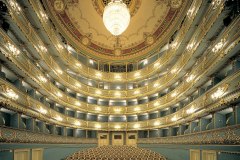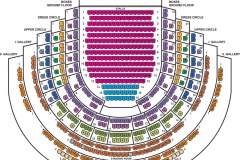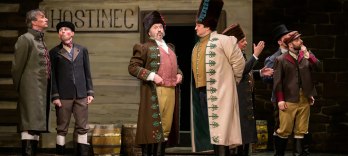Médée
Mo | Tu | We | Th | Fr | Sa | Su |
Language: In Italian, surtitles in Czech, English
Medea has fascinated numerous artists, from Antiquity to modern times – from Euripides through Seneca, Pierre Corneille, Franz Grillparzer, Jean Anouilh, Pier Paolo Pasolini and Heiner Müller, to contemporary creators.There are a number of operas based on this extremely dramatic, grisly and, notwithstanding (or owing precisely to) its brutality, highly human story. Medea sacrifices everything for her beloved Jason, and saves his life on multiple occasions – and she only wants one thing in return: constant love. Yet Jason’s craving for power is stronger than his desire for Medea, hence after ten years of marriage he intends to abandon her to wed another woman, who will finally make his dream come true. Deeply hurt, the betrayed Medea decides to take revenge, not hesitating to dispense with that which mothers regard as the most sacred – the lives of her own children … One of those who set the final, most heart-wrenching part of the long Medea story was Luigi Cherubini, an Italian composer who spent most of his career in France.
Although written to a French libretto in Paris, Médée clearly reveals his having been inspired by Italian music music, thus being a direct precursor of Rossini’s, Donizetti’s and Bellini’s operas. The original score contained spoken dialogue, which after Cherubini’s death was replaced by sung recitatives, which resulted in the piece’s acquiring an even more Italian sound, as well as, in places, a markedly Romantic tone.
The Italian, early 20th-century, version of Médée, to be staged at the Estates Theatre, was primarily made famous in the 1950s and 1960s by the divine soprano Maria Callas, for whom Medea was an iconic role.
National Theatre Chorus
National Theatre Orchestra
Synopsis
Place: Corinth
Time: Antiquity
Act 1
Outside the palace of King Créon
Dircé is preparing for her wedding to Jason. Years ago, Jason had stolen the golden fleece with the help of Médée, who had betrayed her family and established a relationship with Jason, the result of which was two children. Although Jason has since abandoned Médée, she reappears and demands that he return to her. Jason refuses and Médée curses him, swearing vengeance.
Act 2
Inside the palace
In despair, Médée is encouraged by her slave, Néris, to leave the city. Créon then appears and orders that Médée leave. She asks for one more day with her children and, after the king agrees, she appears to be calmer and gives Néris two wedding presents to take to her rival.
Act 3
Between the palace and the temple
Néris brings the two children out to where Médée is waiting. Sounds of lamentation are heard from within the palace and it is discovered that one of Médée's wedding presents has poisoned Dircé. An angry crowd gathers and Néris, Médée, and the children take refuge in the temple. From the temple, the two women reappear with Médée grasping a blood-stained knife with which she has killed her two children. Médée curses Jason and disappears into the air. The temple goes up in flames and the crowd flees in terror.
Program and cast
Conductor: Robert Jindra, David Švec
Medea: Světlana Aksenova
Giasone: Evan LeRoy Johnson
Creonte: Marcell Bakonyi
Glauce: Jana Sibera
Neris: Arnheiður Eiríksdóttir
1st Maid: Magdaléna Hebousse
2nd Maid: Alžběta Vomáčková
Stage director - Roland Schwab
Sets - Paul Zoller
Costumes - Sabine Blickenstorfer
Chorus master - Lukáš Kozubík
Dramaturgy - Ondřej Hučín
Estates Theatre
The Estates Theatre today
The Estates Theatre is one of the most beautiful historical theatre buildings in Europe. It has been part of the National Theatre since 1920. The Opera, Drama and Ballet ensembles give repertory performances at the Estates Theatre.
History
The Estates Theatre is one of the most beautiful historic theatre buildings in Europe. Its construction was initiated by the enlightened aristocrat František Antonín Count Nostitz Rieneck, led by the desire to aggrandise his native city as well as the souls of its inhabitants. The construction lasted less than two years and the Theatre was opened in 1783. This project, extremely important for the Prague of the time, was in keeping with the zeitgeist of the late 18th century, a time when national theatres were being built at European courts, royal seats and cultural centres in the spirit of the Enlightenment idea that a generally accessible theatre is a moral institution demonstrating the cultural level of the nation.
The first, sporadic Czech-language performances took place in 1785. From 1812 onwards there were regular Sunday and holiday matinees. At that time, these performances became to a certain degree a political matter too. Thus arising in the difficult years following the failed revolution in 1848 was the idea of a Czech National Theatre.
By car to the National Theatre car park
To the centre (OldTown), approach on Masarykovo nábřeží (Masaryk embankment) in the direction from the Dancing House, at the crossroads in front of the National Theatre turn right to Divadelní street and then right again to Ostrovní street to the National Theatre car park. Parking costs 50 CZK/h.
From there, walk to the Estates Theatre along Národní street, then 28. října street, turn left on to Na Můstku street and right to Rytířská street.
Other nearby secure car parks:
Kotva department store (Revoluční 1/655, Prague 1), then walk along Králodvorská street to Ovocný trh.
Palladium department store (Na Poříčí 1079/3a, Prague 1), then walk along Králodvorská street to Ovocný trh, or to the Powder Gate through Celetná street to Ovocný trh.
By tram
By daytime trams Nos. 6, 9, 18 and 22 or night trams Nos. 53, 57, 58 and 59 to the stop “Národní třída”, then by foot along Národní street, then 28. října street, turn left to Na Můstku street and right to Rytířská street.
By daytime trams Nos. 5, 8, 14 and 26 or night trams Nos. 51, 54 and 56 to the stop “Náměstí Republiky”, then on foot around the Municipal House to the Powder Gate, on Celetná street to Ovocný trh.
By daytime trams Nos. 3, 9, 14, 24 or night trams Nos. 52, 54, 55, 56 and 58 to the stop “Jindřišská”, then on foot along Nekázanka / Panská streets, turn left to Na Příkopě street and then right to Havířská street (from Na Příkopě street you can also walk through the Myslbek arcade).
By metro
To the station “Můstek”, lines A and B (green and yellow), then on foot through Na Můstku street and right to Rytířská street.
Performances: Th 24 Apr 2025, 11:00
Performances: Mo 09 Sep 2024,
Performances: Th 29 Aug 2024,
Performances: Th 26 Sep 2024,
Performances: Sa 09 Nov 2024,
Performances: Sa 07 Dec 2024,

 EN
EN DE
DE IT
IT FR
FR ES
ES RU
RU JP
JP RO
RO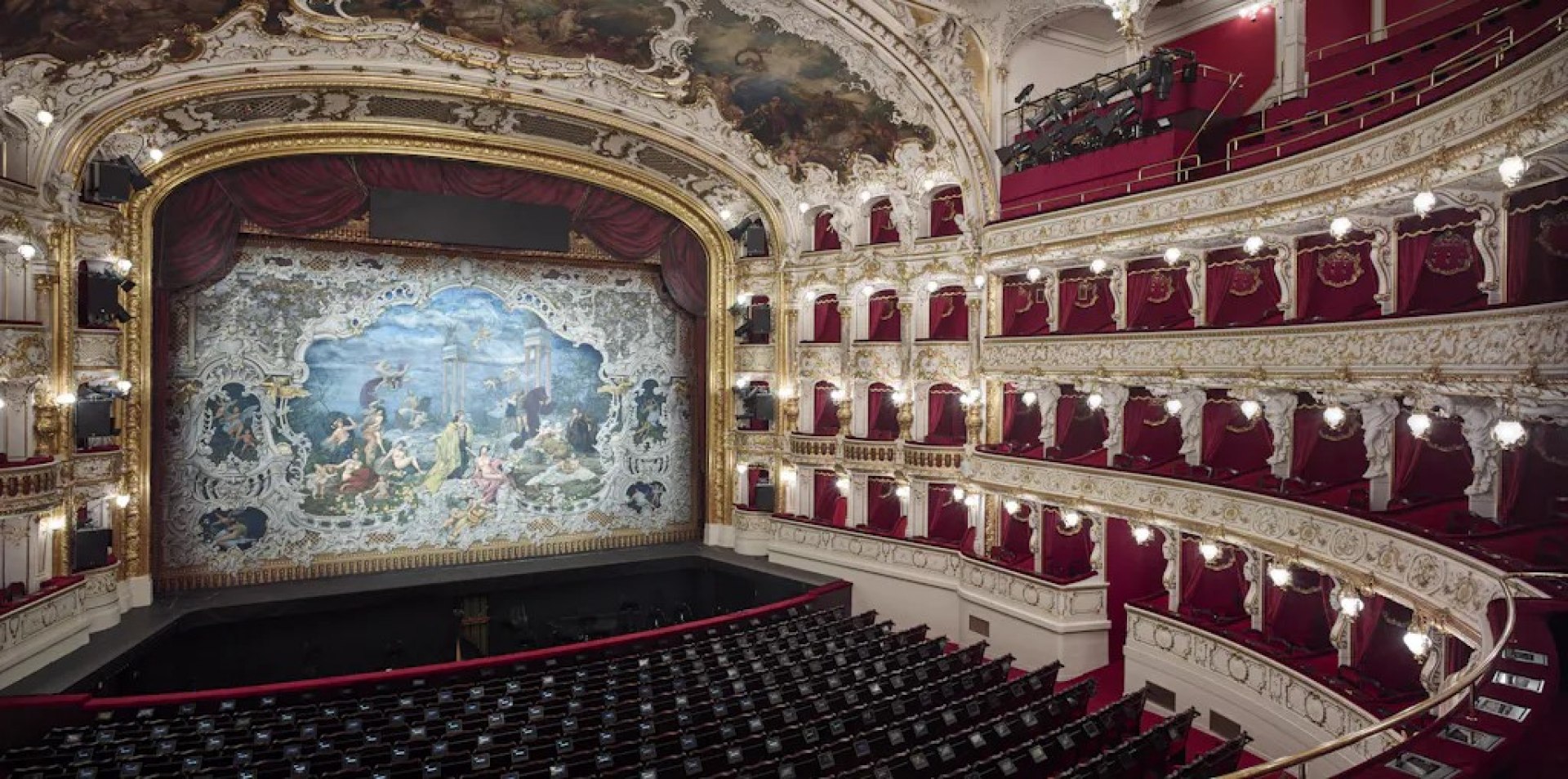
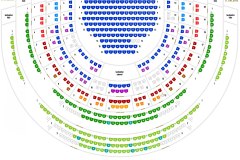 Seating plan
Seating plan 